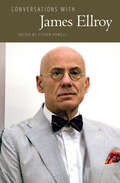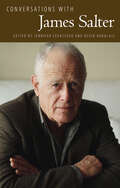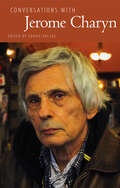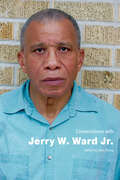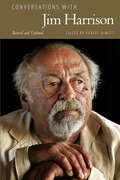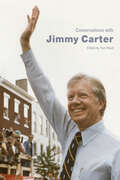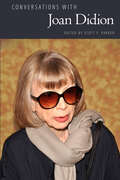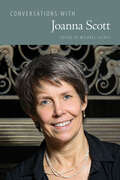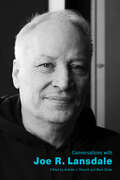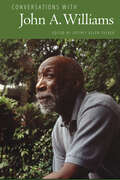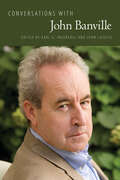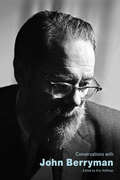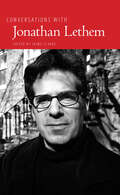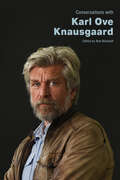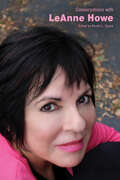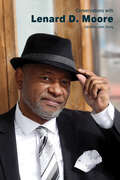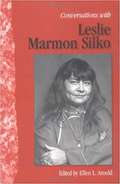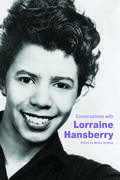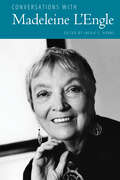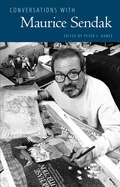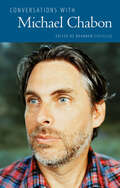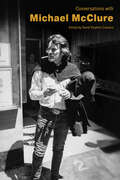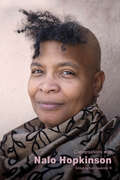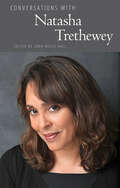- Table View
- List View
Conversations with James Ellroy (Literary Conversations Series)
by Steven PowellAs a novelist who has spent years crafting and refining his intense and oft outrageous “Demon Dog of American Crime Fiction” persona, James Ellroy has used interviews as a means of shaping narratives outside of his novels. Conversations with James Ellroy covers a series of interviews given by Ellroy from 1984 to 2010, in which Ellroy discusses his literary contribution and his public and private image. Born Lee Earle Ellroy in 1948, James Ellroy is one of the most critically acclaimed and controversial contemporary writers of crime and historical fiction. Ellroy's complex narratives, which merge history and fiction, have pushed the boundaries of the crime fiction genre: American Tabloid, a revisionist look at the Kennedy era, was Time magazine's Novel of the Year 1995, and his novels L.A. Confidential and The Black Dahlia were adapted into films. Much of Ellroy's remarkable life story has served as the template for the personal obsessions that dominate his writing. From the brutal, unsolved murder of his mother to his descent into alcohol and drug abuse, his sexual voyeurism, and his stints at the Los Angeles County Jail, Ellroy has lived through a series of hellish experiences that few other writers could claim. In Conversations with James Ellroy, the author talks extensively about his life, his literary influences, his persona, and his attitudes towards politics and religion. In interviews with fellow crime writers Craig McDonald, David Peace, and others, including several previously unpublished interviews, Ellroy is at turns charismatic and eloquent, combative and enigmatic.
Conversations with James Salter (Literary Conversations Series)
by Jennifer Levasseur Kevin RabalaisJames Salter (1925-2015) has been known throughout his career as a writer's writer, acclaimed by such literary greats as Susan Sontag, Richard Ford, John Banville, and Peter Matthiessen for his lyrical prose, his insightful and daring explorations of sex, and his examinations of the inner lives of women and men.Conversations with James Salter collects interviews published from 1972 to 2014 with the award-winning author of The Hunters, A Sport and a Pastime, Light Years, and All That Is. Gathered here are his earliest interviews following acclaimed but moderately selling novels, conversations covering his work as a screenwriter and award-winning director, and interviews charting his explosive popularity after publishing All That Is, his first novel after a gap of thirty-four years. These conversations chart Salter's progression as a writer, his love affair with France, his military past as a fighter pilot, and his lyrical explorations of gender relations.The collection contains interviews from Sweden, France, and Argentina appearing for the first time in English. Included as well are published conversations from the United States, Canada, and Australia, some of which are significantly extended versions, giving this collection an international scope of Salter's wide-ranging career and his place in world literature.
Conversations with Jerome Charyn (Literary Conversations Series)
by Sophie VallasThis volume of fourteen interviews covers the prolific and rich career of author Jerome Charyn (b. 1937). Four of the interviews appear in English for the first time, and two interviews appear here in print for the first time as well. As one of his autobiographical volumes claims, Jerome Charyn is a “Bronx Boy,” a child born from immigrant parents who went through Ellis Island in the 1920s like so many other travelers without luggage, a “little werewolf” who grew up on his own in the chaos of the Bronx ghetto. “I think I was defined by two things: World War II and the movies.” His work remains deeply marked by this childhood largely forgotten by the American Dream. If Charyn has spent much of his life in Paris, he has paradoxically never left the Bronx: “‘El Bronx’ is there inside my head, and I revisit it the way Hemingway would fish the Big Two-Hearted River in his dreams.” His whole work is a long attempt at evoking his own history and celebrating his lifelong marveling at the power of language—“our second skin”—as well as his deep, unflinching belief in the promises of fiction. Since 1964, Charyn has published more than fifty books ranging from fiction to nonfiction and including short stories; very popular crime novels; graphic novels cowritten with European artists; essays on American culture and cinema as well as on New York; autobiography; and biography—an ever-changing production that has made it difficult for critics to classify him. And yet in many ways Charyn's writing thrives on constant currents: the words “voice,” “song,” “undersong,” or “rhythm” return frequently in his interviews as he explains what literature is to him and ceaselessly asserts that he is trying “to find a music for a musicless world,” a language for “people who cannot speak.”
Conversations with Jerry W. Ward Jr. (Literary Conversations Series)
by John ZhengJerry W. Ward Jr. (b. 1943) has published nonfiction, literary criticism, encyclopedias, anthologies, and poetry. Ward is also a highly respected scholar with a specialty in African American literature and has been recognized internationally as one of the leading experts on Richard Wright. Ward was Lawrence Durgin Professor of Literature at Tougaloo College, served as a member of both the Mississippi Humanities Council and the Mississippi Advisory Committee for the US Commission on Civil Rights, and cofounded the Richard Wright Circle and the Richard Wright Newsletter. He has won numerous awards, and in 2001 he was inducted into the International Literary Hall of Fame for Writers of African Descent. Conversations with Jerry W. Ward Jr. aims to add an indispensable source to American literature and African American studies. It offers an account of Ward's intelligent and thoughtful responses to questions about literature, literary criticism, teaching, writing, civil rights, Black aesthetics, race, and culture. Throughout the fourteen interviews collected in this volume that range from 1995 to 2021, Ward demonstrates his responsibilities as a contemporary scholar, professor, writer, and social critic. His charming personality glimmers through these interviews, which, in a sense, are inner views that allow us to see into his mind, understand his heart, and appreciate his wit.
Conversations with Jim Harrison, Revised and Updated (Literary Conversations Series)
by Robert DeMottConversations with Jim Harrison, Revised and Updated offers a judicious selection of interviews spanning the writing career of Jim Harrison (1937–2016) from its beginnings in the 1960s to the last interview he gave weeks before his death in March 2016. Harrison labeled himself and lived as a “quadra-schizoid” writer. He worked in fiction, poetry, nonfiction, and screenwriting, and he published more than forty books that attracted an international following. These interviews supply a lively narrative of his progress as a major contemporary American author. This collection showcases Harrison's pet peeves, his candor and humility, his sense of humor, and his patience. He does not shy from his authorial obsessions, especially his efforts to hone the novella, for which he is considered a contemporary master, or the frequency with which he defied polite narrative conventions and created memorable, resolute female characters. Each conversation attests to the depth and range of Harrison’s considerable intellectual and political preoccupations, his fierce social and ecological conscience, his aesthetic beliefs, and his stylistic orientations in poetry and prose.
Conversations with Jimmy Carter (Literary Conversations Series)
by Tom HeadWhen Jimmy Carter (b. 1924) lost the presidency in 1980, it would have been reasonable to think his public life was coming to an end. The moderate, evangelical, blue-jeans-wearing peanut farmer made an unlikely governor of Georgia, and an even less likely winner of the vicious 1976 Democratic presidential primary. Coming into an era of American politics where evangelical and rural voters became increasingly identified with the Reagan revolution, and the Democratic Party’s identity became increasingly secular and urban, he did not fit neatly into the political categories of the emerging decade. But it was not politics that would define President Carter in the end: it would be his humble Christian faith and his enduring commitment to the poor, to peace, and to human rights.In Conversations with Jimmy Carter, ten interviews, drawn from Carter’s five decades as a national public figure and author, capture the complexities and contradictions that have defined him—and that have helped to both reflect and shape the highest aspirations of the American experiment.
Conversations with Joan Didion (Literary Conversations Series)
by Scott F. ParkerJoan Didion (b. 1934) is an American icon. Her essays, particularly those in Slouching Towards Bethlehem and The White Album, have resonated in American culture to a degree unmatched over the past half century. Two generations of writers have taken her as the measure of what it means to write personal essays. No one writes about California, the sixties, media narratives, cultural mythology, or migraines without taking Didion into account. She has also written five novels; several screenplays with her husband, John Gregory Dunne; and three late-in-life memoirs, including The Year of Magical Thinking and Blue Nights, which have brought her a new wave of renown.Conversations with Joan Didion features seventeen interviews with the author, spanning decades, continents, and genres. Didion reflects on her childhood in Sacramento; her time at Berkeley (both as a student and later as a visiting professor), in New York, and in Hollywood; her marriage to Dunne; and of course her writing. Didion describes her methods of writing, the ways in which the various genres she has worked in inform one another, and the concerns that have motivated her to write.
Conversations with Joanna Scott (Literary Conversations Series)
by Michael LackeyJoanna Scott (b. 1960) has been one of America’s leading writers since the 1990s. Both critically acclaimed and winner of numerous prestigious awards, Scott’s unique and probing vision and masterful writing has inspired readers to adjust their perceptions of life and of themselves. Her fiction jolts and illuminates, frequently exposing the degree to which the perverse is natural and the ordinary is twisted and demented. Conversations with Joanna Scott presents eighteen interviews that span two decades and are as much about the process of reading as they are about writing. Witty, probing, wide-ranging, and insightful, Scott’s off-the-cuff observations about literature and life are as thought-provoking as some of the most memorable lines and scenes in her fiction. Not only shedding new light on Scott’s fiction, Conversations with Joanna Scott also illuminates enduring areas of inquiry, like the challenge of trying to make art out of sentences; the effort to recover and imagine lost stories from the past; the changing status of the literary imagination; fictional portraiture and the productive possibilities that come from blending biography and fiction; and concerns about literacy.Joanna Scott has made her name through brilliant, award-winning novels, but this volume clarifies why she is also one of America’s leading public intellectuals and an astute critic of literature and culture.
Conversations with Joe R. Lansdale (Literary Conversations Series)
by Andrew J. Rausch and Mark SladeJoe R. Lansdale (b. 1951), the award-winning author of such novels as Cold in July (1989) and The Bottoms (2000), as well as the popular Hap and Leonard series, has been publishing novels since 1981. Lansdale has developed a tremendous cult audience willing to follow him into any genre he chooses to write in, including horror, western, crime, adventure, and fantasy. Within these genres, his stories, novels, and novellas explore friendship, race, and life in East Texas. His distinctive voice is often funny and always unique, as characterized by such works as Bubba Ho-Tep (1994), a novella that centers on Elvis Presley, his friend who believes himself to be John F. Kennedy, and a soul-sucking ancient mummy. This same novella won a Bram Stoker Award, one of the ten Bram Stoker Awards given to Lansdale thus far in his illustrious career. Wielding a talent that extends beyond the page to the screen, Landsdale has also written episodes for Batman: The Animated Series and Superman: The Animated Series. Conversations with Joe R. Lansdale brings together interviews from newspapers, magazines, and podcasts conducted throughout the prolific author’s career. The collection includes conversations between Lansdale and other noted peers like Robert McCammon and James Grady; two podcast transcripts that have never before appeared in print; and a brand-new interview, exclusive to the volume. In addition to shedding light on his body of literary work and process as a writer, this collection also shares Lansdale’s thoughts on comics, atheism, and martial arts.
Conversations with John A. Williams (Literary Conversations Series)
by Jeffrey Allen TuckerOne of the most prolific African American authors of his time, John A. Williams (1925-2015) made his mark as a journalist, educator, and writer. Having worked for Newsweek, Ebony, and Jet magazines, Williams went on to write twelve novels and numerous works of nonfiction. A vital link between the Black Arts movement and the previous era, Williams crafted works of fiction that relied on historical research as much as his own finely honed skills. From The Man Who Cried I Am, a roman à clef about expatriate African American writers in Europe, to Clifford's Blues, a Holocaust novel told in the form of the diary entries of a gay, black, jazz pianist in Dachau, these representations of black experiences marginalized from official histories make him one of our most important writers.Conversations with John A. Williams collects twenty-three interviews with the three-time winner of the American Book Award, beginning with a discussion in 1969 of his early works and ending with a previously unpublished interview from 2005. Gathered from print periodicals as well as radio and television programs, these interviews address a range of topics, including anti-black violence, Williams's WWII naval service, race and publishing, interracial romance, Martin Luther King Jr., growing up in Syracuse, the Prix de Rome scandal, traveling in Africa and Europe, and his reputation as an angry black writer. The conversations prove valuable given how often Williams drew from his own life and career for his fiction. They display the integrity, social engagement, and artistic vision that make him a writer to be reckoned with.
Conversations with John Banville (Literary Conversations Series)
by Earl G. Ingersoll and John CusatisJohn Banville (b. 1945) is a distinguished novelist and winner of several prestigious awards, including the Man Booker Prize for his novel The Sea. As a teenager Banville hoped to be a painter, and although he ultimately decided he lacked the talent for it, his passion for painting continues to influence and inform his work. Banville conceives the novel as a work of art aimed not at the present, but for the ages. He aspires to create narratives that offer readers a sense of what it is to be conscious, human, and feeling, and aims to convey his conviction that “the familiar is always unfamiliar, the ordinary extraordinary.” Conversations with John Banville is the first interview collection with this esteemed writer and includes eighteen interviews that reflect on nearly five decades of work, from his first book, Long Lankin, to his novel Mrs. Osmond and memoir, Time Pieces. The collection also includes discussions about—and with, in the case of James Gleick’s 2014 interview—Banville’s alter ego, Benjamin Black, who writes crime novels. Highly engaging and insightful, Banville’s interviews offer a variety of writerly autobiography regarding what he has aimed to do in his work and how he continues to pursue perfection, which he has known from the beginning must be impossible.
Conversations with John Berryman (Literary Conversations Series)
by Eric HoffmanThe poetry of John Berryman (1914–1972) is primarily concerned with the self in response to the rapid social, political, sexual, racial, and technological transformations of the twentieth century, and their impact on the psyche and spirit, both individual and collective. He was just as likely to find inspiration in his local newspaper as he was from the poetry of Hopkins or Milton. In fact, in contrast to the popular perception of Berryman drunkenly composing strange, dreamlike, abstract, esoteric poems, Berryman was intensely aware of craft. His best work routinely utilizes a variety of rhetorical styles, shifting effortlessly from the lyric to the prosaic. For Berryman, poetry was nothing less than a vocation, a mission, and a way of life. Though he desired fame, he acknowledged its relative unimportance when he stated that the “important thing is that your work is something no one else can do.” As a result, Berryman very rarely granted interviews—“I teach and I write,” he explained, “I’m not copy”—yet when he did the results were always captivating. Collected in Conversations with John Berryman are all of Berryman’s major interviews, personality pieces, profiles, and local interest items, where interviewers attempt to unravel him, as both Berryman and his interlocutors struggle to find value in poetry in a fallen world.
Conversations with Jonathan Lethem (Literary Conversations Series)
by Jaime ClarkeConversations with Jonathan Lethem collects fourteen interviews, conducted over a decade and a half, with the Brooklyn-born author of such novels as Girl in Landscape, Motherless Brooklyn, The Fortress of Solitude, Chronic City, and many others. Winner of the National Book Critics' Circle Award, Lethem (b. 1964) covers a wide range of subjects, from what it means to incorporate genre into literature, to the impact of the death of his mother on his life and work, to his being a permanent "sophomore on leave" from Bennington College, as well as his flight from Brooklyn to California and its lasting effect on his fiction. Lethem also reveals the many literary and pop culture influences that have informed his writing life. Readers will find Lethem as charming and generous and intelligent as his work. His examination of what it means to live a creative life will reverberate and enlighten scholars and fans alike. His thoughts on science fiction, intellectual property, literary realism, genre, movies, and rock 'n' roll are articulated with elán throughout the collection, as are his comments on his own development as a craftsman.
Conversations with Karl Ove Knausgaard (Literary Conversations Series)
by Bob BlaisdellNorwegian author Karl Ove Knausgaard (b. 1968) made a literary mark on his home country in 1998, when his debut novel won the prestigious Norwegian Critics Prize for Literature. His fame continued to grow with the publication of his six-volume autobiographical series Min Kamp, or My Struggle. Translated into English in 2012, the critically acclaimed and controversial series garnered global attention, as did its author. Conversations with Karl Ove Knausgaard is a collection of twenty-two interviews, each conducted during the ten-year span in which Knausgaard’s literary prowess gained worldwide recognition.Knausgaard is both a daring writer and a daring interviewee. He grounds his observations in the ordinary aspects of the world around him, which, he insists, is the same world in front of most of his readers. He regards his appearances in newspapers, magazines, and literary festivals as “a performance,” where he plays himself. While that role may differ from his inner life, it is consistent with the role he plays in his autobiographical novels. Fans of Knausgaard will easily recognize this public persona, an embodiment of the protagonist, husband, and father featured in My Struggle and in the Seasons quartet.Knausgaard discusses his work, aspects of his personal life, and his writing routines and practices in marvelous detail. He comments on literary and artistic world classics and on international contemporary authors. A bilingual speaker, he is accustomed to appearing before the press and in front of audiences in his roles as a famous author and as the publisher and cofounder of the publishing house Pelikanen (Pelican). Remarkable for his candor and directness, Knausgaard delivers the same variety and number of surprises in these interviews as he does in his most thrilling books.
Conversations with LeAnne Howe (Literary Conversations Series)
by Kirstin L. SquintConversations with LeAnne Howe is the first collection of interviews with the groundbreaking Choctaw author, whose genre-bending works take place in the US Southeast, Oklahoma, and beyond our national borders to bring Native American characters and themes to the global stage. Best known for her American Book Award–winning novel Shell Shaker (2001), LeAnne Howe (b. 1951) is also a poet, playwright, screenwriter, essayist, theorist, and humorist. She has held numerous honors including a Fulbright Distinguished Scholarship in Amman, Jordan, from 2010 to 2011, and she was the recipient of the Modern Language Association’s first Prize for Studies in Native American Literatures, Cultures, and Languages for her travelogue, Choctalking on Other Realities (2013).Spanning the period from 2002 to 2020, the interviews in this collection delve deeply into Howe’s poetics, her innovative critical methodology of tribalography, her personal history, and her position on subjects ranging from the Lone Ranger to Native American mascots. Two previously unpublished interviews, “‘An American in New York’: LeAnne Howe” (2019) and “Genre-Sliding on Stage with LeAnne Howe” (2020), explore unexamined areas of her personal history and how it impacted her creative work, including childhood trauma and her incubation as a playwright in the 1980s. These conversations along with 2019’s Occult Poetry Radio interview also give important insights on the background of Howe’s newest critically acclaimed work, Savage Conversations (2019), about Mary Todd Lincoln’s hallucination of a “Savage Indian” during her time in Bellevue Place sanitarium. Taken as a whole, Conversations with LeAnne Howe showcases the development and continued impact of one of the most important Indigenous American writers of the twenty-first century.
Conversations with Lenard D. Moore (Literary Conversations Series)
by John ZhengKnown internationally for his Japanese-style poetry, Lenard D. Moore (b. 1958) has published eight poetry collections over the course of his career. Moore has distinguished himself especially in such forms as jazz poetry, haiku, tanka, renga, sequence, and haibun, expressing moments of aesthetic delight as well as a voice enriched with African American culture. Conversations with Lenard D. Moore is a fundamental collection of sixteen interviews with the esteemed writer and former president of the Haiku Society of America.To Moore, jazz is a joyful celebration of American life and culture. The impacts of such great jazz musicians as Max Roach, John Coltrane, Thelonious Monk, Duke Ellington, and Ray Charles are clear in his poetry. The conversations collected here lead the reader into Moore’s creative mind, demonstrating his fusion of African American music, culture, and history into poetry, especially his jazz poetry, jazzku, and bluesku. In interviews that range from 1995 to 2023, Moore reveals his capabilities and responsibilities as a contemporary poet, professor, mentor, editor, and organizer. This volume serves as an indispensable source for writers and readers of poetry and African American literature.
Conversations with Leslie Marmon Silko
by Ellen L. ArnoldThe conversations included here reveal how Silko's thought and writing have been influenced by American and British literature, Eastern philosophies, economics, politics, psychology, and physics. As she integrates these into her powerful works and her expansive interviews, she expresses a hopeful vision of global spiritual awakening.
Conversations with Lorraine Hansberry (Literary Conversations Series)
by Mollie GodfreyHonorable Mention Recipient of the Modern Language Association Prize for Collaborative, Bibliographical, or Archival ScholarshipSpanning from the debut of A Raisin in the Sun on Broadway in 1959 to her early death from cancer in January 1965, Lorraine Hansberry’s short stint in the public eye changed the landscape of American theater. With A Raisin in the Sun, Hansberry (1930–1965) became both the first African American woman to have a play produced on Broadway and the first to win the prestigious New York Drama Critics’ Circle Award. Resonating deeply with the aims of the civil rights movement, Raisin also ushered in a new era of Black representation on the stage and screen, displacing the cartoonish stereotypes that were the remnants of blackface minstrelsy in favor of complex three-dimensional portrayals of Black characters and Black life. Hansberry’s public discourse in the aftermath of Raisin’s success also disrupted mainstream critical tendencies to diminish the work of Black artists, helping pave the way for future work by Black playwrights. Conversations with Lorraine Hansberry is the first volume to collect all of her substantive interviews in one place, including many radio and television interviews that have never before appeared in print. The twenty-one pieces collected here—ranging from just before the Broadway premiere of A Raisin in the Sun to less than six months before Hansberry’s death—offer an incredible window into Hansberry’s aesthetic and political thought. In these conversations, Hansberry explores many of the questions most often put to Black writers of the mid-twentieth century—including everything from her thinking about the relationship between art and protest, universality and particularity, and realism and naturalism, to her sense of the relationship between Black intellectuals and the Black masses, integration and Black Nationalism, and African American and Pan-African liberation. Taken together, these interviews reveal the insight, intensity, and eloquence that made Hansberry such a transformative figure in American letters.
Conversations with Madeleine L'Engle (Literary Conversations Series)
by Jackie C. HorneConversations with Madeleine L’Engle is the first collection of interviews with the beloved children’s book author best known for her 1962 Newbery Award–winning novel, A Wrinkle in Time. However, Madeleine L’Engle's accomplishments as a writer spread far beyond children’s literature. Beginning her career as a literary novelist for adults, L’Engle (1918–2007) continued to write fiction for both young and old long after A Wrinkle in Time. In her sixties, she published personal memoirs and devotional texts that explored her relationship with religion. At the time of her death, L’Engle was mourned by fans of her children’s books and the larger Christian community.L’Engle’s books, as well as her life, were often marked by contradictions. A consummate storyteller, L’Engle carefully crafted and performed a public self-image via her interviews. Weaving through the documentable facts in these interviews are partial lies, misdirections, and wish-fulfillment fantasies. But, when read against her fictions, these “truths” can help us see L’Engle more deeply—what she wanted for herself and for her children, what she believed about good and evil, and what she thought was the right way and the wrong way to be a family—than if she had been able to articulate the truth more directly.The thirteen interviews collected here reveal an amazing feat of authorial self-fashioning, as L’Engle transformed from novelist to children’s author to Christian writer and attempted to craft a public persona that would speak to each of these different audiences in meaningful, yet not painfully revealing, ways.
Conversations with Maurice Sendak (Literary Conversations Series)
by Peter C. KunzeMaurice Sendak (1928–2012) stands out as one of the most respected, influential authors of the twentieth century. Though primarily known as a children’s book writer and illustrator, he did not limit himself to these areas. He saw himself first and foremost as an artist. In this collection of interviews, Sendak presents himself as a writer, illustrator, set designer, and librettist. From his early work with Randall Jarrell and Ruth Krauss through his later work with Tony Kushner and Spike Jonze, Sendak worked as a collaborator with a passion for the arts.The interviews here, many of which are hard to find or previously unpublished, span from 1966 through 2011. They show not only Sendak’s shifting artistic interests, but also changes in how he understood himself and his craft. What emerges is a portrait of an author and an artist who was alternately solemn and playful, congenial and irascible, sophisticated and populist. The man who showed millions of children and adults alike what’s cooking in the night kitchen and where the wild things are, Sendak remains an American original who redefined the picture book and changed children’s literature—and its readers—forever.
Conversations with Michael Chabon (Literary Conversations Series)
by Brannon CostelloSince the publication of his first novel, The Mysteries of Pittsburgh, launched him to fame, Michael Chabon (b. 1963) has become one of contemporary literature's most acclaimed novelists by pursuing his singular vision across all boundaries of genre and medium. A firm believer that reading even the most challenging literature should be a fundamentally pleasurable experience, Chabon has produced an astonishingly diverse body of work that includes detective novels, weird tales of horror, alternate history science fiction, and rollicking chronicles of swashbuckling adventure alongside tender coming-of-age stories, sprawling social novels, and narratives of intense introspection. Uniting them all is Chabon's utterly distinct prose style--exuberant and graceful, sometimes ironic but never cynical. His work has earned accolades ranging from the Pulitzer Prize to science fiction's Hugo and Nebula Awards. Conversations with Michael Chabon collects eighteen revealing interviews with the renowned author of The Amazing Adventures of Kavalier & Clay, The Yiddish Policemen's Union, and other much-admired works. Spanning nearly twenty years and drawn from science fiction fan magazines and literary journals alike, these interviews shed new light on the central concerns of Chabon's fiction, including the importance of dismantling the false divide between literary and lowbrow, his evolving relationship to Jewish culture and literature, the unique properties of male friendship, and the complexities of race in contemporary America. These interviews are essential reading for anyone seeking a better understanding of the life and work of an author who has been instrumental in defining the landscape of contemporary American fiction.
Conversations with Michael McClure (Literary Conversations Series)
by David Stephen CalonneConversations with Michael McClure features twenty interviews from 1969 to 2015 that chronicle the capacious scope of McClure’s creativity. McClure (1932–2020) is notable not only for his considerable achievements as a poet and prose writer of the Beat Generation, but also for the many collaborative connections he forged over seven decades. From the 1950s to his death, McClure worked with an astonishing range of important figures in the worlds of painting, filmmaking, music, and science. McClure counted among his friends and acquaintances Bruce Conner, Harold Pinter, Amiri Baraka, Richard Brautigan, Wallace Berman, George Herms, Lawrence Jordan, Dennis Hopper, Bob Dylan, Janis Joplin, Jim Morrison, Ray Manzarek, Sterling Bunnell, Francis Crick, Gary Snyder, Francesco Clemente, and Diane di Prima.During his early years in San Francisco, McClure attended Kenneth Rexroth’s literary evenings and formed significant lifelong friendships. Among those friends were poets Philip Lamantia and Robert Duncan, who became a mentor to McClure. He also learned much from Charles Olson and adopted several features of Olson’s concept of “Projective Verse” in his own work. McClure’s exchange of letters with experimental filmmaker Stan Brakhage lasted for four decades. During his illustrious career, McClure published fourteen books of poetry, eight books of plays, and four collections of essays. Conversations with Michael McClure reveals the many contributions of this central personality in the evolution of the American counterculture.
Conversations with N. Scott Momaday
by Matthias SchubnellA collection of various interviews with Momaday.
Conversations with Nalo Hopkinson (Literary Conversations Series)
by Isiah Lavender IIIA key figure in contemporary speculative fiction, Jamaican-born Canadian Nalo Hopkinson (b. 1960) is the first Black queer woman as well as the youngest person to be named a Grand Master by the Science Fiction and Fantasy Writers of America. Her Caribbean-inspired narratives—Brown Girl in the Ring, Midnight Robber, The Salt Roads, The New Moon’s Arms, The Chaos, and Sister Mine—project complex futures and complex identities for people of color in terms of race, sex, and gender. Hopkinson has always had a vested interest in expanding racial and ethnic diversity in all facets of speculative fiction from its writers to its readers, and this desire is reflected in her award-winning anthologies. Her work best represents the current and ongoing colored wave of science fiction in the twenty-first century.In twenty-one interviews ranging from 1999 until 2021, Conversations with Nalo Hopkinson reveals a writer of fierce intelligence and humor in love with ideas and concerned with issues of identity. She provides powerful insights on code-switching, race, Afrofuturism, queer identities, sexuality, Caribbean folklore, and postcolonial science fictions, among other things. As a result, the conversations presented here very much demonstrate the uniqueness of her mind and her influence as a writer.
Conversations with Natasha Trethewey (Literary Conversations Series)
by Joan Wylie HallUnited States Poet Laureate Natasha Trethewey (b. 1966) describes her mode as elegiac. Although the loss of her murdered mother informs each book, Trethewey's range of forms and subjects is wide. In compact sonnets, elegant villanelles, ballad stanzas, and free verse, she creates monuments to mixed-race children of colonial Mexico, African American soldiers from the Civil War, a beautiful prostitute in 1910 New Orleans, and domestic workers from the twentieth-century North and South. Because her white father and her black mother could not marry legally in Mississippi, Trethewey says she was "given" her subject matter as "the daughter of miscegenation." A sense of psychological exile is evident from her first collection, Domestic Work (2000), to the recent Thrall (2012). Biracial people of the Americas are a major focus of her poetry and her prose book Beyond Katrina, a meditation on family, community, and the natural environment of the Mississippi Gulf Coast. The interviews featured within Conversations with Natasha Trethewey provide intriguing artistic and biographical insights into her work. The Pulitzer Prize-winning poet cites diverse influences, from Anne Frank to Seamus Heaney. She emotionally acknowledges Rita Dove's large impact, and she boldly positions herself in the southern literary tradition of Faulkner and Robert Penn Warren. Commenting on "Pastoral," "South," and other poems, Trethewey guides readers to deeper perception and empathy.
